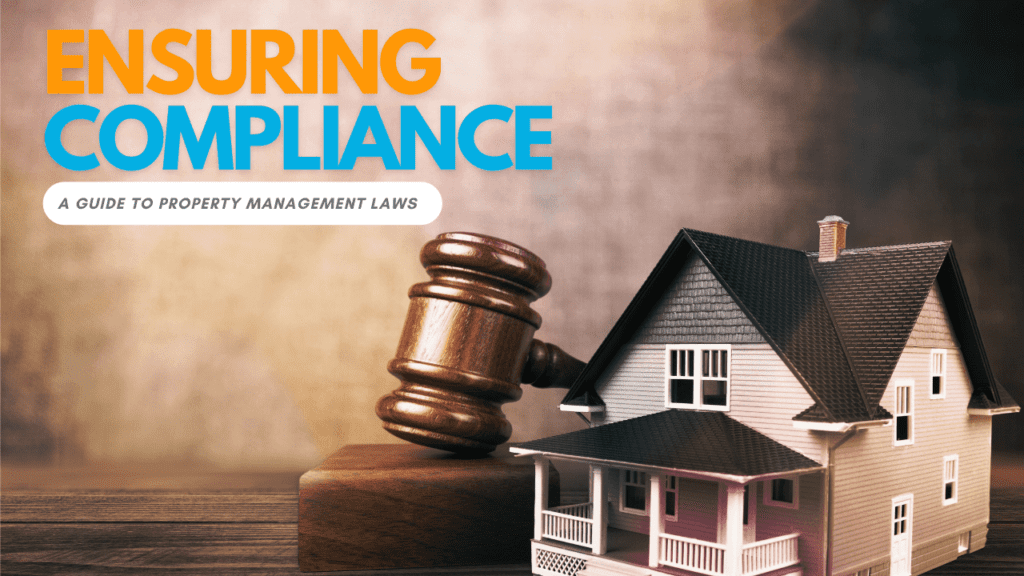
Fresno real estate investments can be a great way to earn some consistent and recurring rental income every month while your property appreciates in value and sets you up for impressive return on investment (ROI).
However, investing in Fresno rental properties means following California’s strict rental laws.
This comes with more than a little bit of risk.
There are a number of laws that dictate how you lease your rental properties, manage them, and maintain them. Laws govern how you work with your residents and what your responsibilities are when it comes to the property and those relationships.
You need to ensure you’re in compliance at all times. Otherwise, you could face some expensive lawsuits.
California is notoriously strict when it comes to rental laws. The legal requirements and regulations are even more robust than most federal laws, especially when it comes to fair housing and tenant protections. This can leave you in danger of making a costly legal mistake, especially if you don’t know the laws or you haven’t been able to keep up with changes in the laws.
As an investor, it’s in your best interests to partner with a professional Fresno property manager who can keep you above board. Property managers invest in continuing education and work closely with attorneys and other experts to ensure all state, federal, and local laws are followed and understood.
Your tenants are well-informed about their rights. You need to be informed, too.
Here’s what we can tell you about the most important rental laws that property managers and landlords must follow while renting out homes in Fresno and throughout California.
Start by Understanding Fair Housing Laws
Generally speaking, California’s state laws are stricter than the federal rental laws that are currently in place. During the worst of the pandemic, the eviction moratorium was stricter in California than it was across the country. We also take things further when it comes to fair housing.
In California, we have a longer list of protected classes than the seven identified by federal laws. While you need to know the federal Fair Housing Act, The Fair Credit Reporting Act, and the Americans with Disabilities Act, when you focus on complying with California’s state laws and Fresno’s local laws, you can usually expect that you’re more than complying with those federal requirements.
California’s fair housing laws prohibit discrimination when it comes to leasing, screening, and managing your rental property based on:
- Race
- Skin color
- Religion or creed
- National origin or ancestry.
- Sex
- Physical or mental disability
- Familial status
- Sexual orientation
- Age
- Gender identification
- Gender expression
- Veteran or military status
- Citizenship
- Primary language
- Marital status
- Source of income
- Genetic information
This is a list that is always evolving. It is essential that when you rent out a property, you keep up on all fair housing laws at a state, local, and federal level.
Rent Control Laws in Fresno and California
Statewide rent control went into effect on January 1, 2020, and that new law applies to most, but not all rental properties throughout the state of California. If your rental home is a multi-family property that is at least 15 years old, you are likely bound by rent control restrictions. Most single-family homes and condos are exempt unless they’re owned in part by a corporation.
If you own a multi-family building or you’re renting out units in a building, you’re likely going to need a solid understanding of rent control limits and requirements. It caps rental increases to five percent plus the cost of living increase set by the Consumer Price Index.
You’re not completely off the hook if your property is exempt from rent control. Your lease agreement must reflect whether your property is bound by the statewide rent control law. The language has to be specific, so make sure you have the correct verbiage, which can easily be provided by a local Fresno property manager.
Just Cause Evictions in Fresno
One of the most prohibitive laws on the books for California rental property owners pertains to evictions. If you need to remove a tenant from your property, know that evictions are heavily regulated in Fresno.
You cannot simply terminate a tenancy because you don’t want to rent your unit to a particular tenant anymore. You can’t evict a tenant because you want to start over with a higher rental amount.
The law requires you to have just cause if you want to terminate a tenancy and not renew a lease agreement.
Legally, there are actually 16 different just causes for eviction in Fresno:
- Nonpayment of rent.
- Lease violation that has not been corrected after written notice.
- Nuisance or substantial damage to the unit.
- Illegal use of the unit.
- Tenant refuses to execute a written extension after the lease ends.
- Refusal to grant the landlord access to the unit as required by law.
- Unapproved subtenant living in the unit.
- Landlord or close relative of the landlord needs to move into the unit.
- Sale of a unit which has been converted to a condo.
- Demolition or removal of the unit from housing use.
- Capital improvements or rehabilitation.
- Substantial rehabilitation of a building that is essentially uninhabitable.
- Ellis Act evictions which require withdrawal from rental housing use all of the units in the building.
- Lead abatement.
- Demolition.
- Good Samaritan Occupancy Status for the tenant expires.
In some of these cases, a tenant relocation payment will be required.
If you’re evicting for nonpayment of rent or because a lease violation or criminal activity has occurred, you’ll want to follow the legal steps set forth in the landlord and tenant laws. There are specific timelines and forms that need to be filed. Every detail is critical. Don’t evict on your own. Get help from a property manager, who can refer you to an attorney.
Section 8 Tenants and Screening Criteria
The Tenant Protection Act of 2019 is mostly known for its rent control and eviction provisions. However, that’s not all it contains. This law also concerns Section 8 tenants and renters who benefit from housing voucher programs. You need to understand why it’s essential to consider all applicants, regardless of how they earn their income. Those housing vouchers used by Section 8 tenants can be legally considered a source of income.
This impacts how you market your rental property and screen your potential tenants. In the past, you could actively advertise that you did not accept Section 8 tenants for a property. There was some distinction about whether certain units were approved for Section 8. You cannot make this distinction anymore.
Make sure your qualifying rental criteria is written and updated. All of your screening criteria can remain the same, but when it comes to your income standards, you have to consider a housing voucher as part of an applicant’s income.
Security Deposits
Security deposit laws are also important to know.
Mistakes with security deposits are common, and they can also be expensive. You don’t want to find yourself in court because you made a mistake or waited too long to return a deposit.
Here’s what you need to know about security deposit laws and your Fresno rental:
- Security deposit limits
You can collect up to two months’ rent for an unfurnished property. If you’re renting out a furnished home, that limit goes up to three times the monthly rent.
- All security deposits must be refundable.
According to California law, there is no such thing as a nonrefundable security deposit.
- Timelines
At the end of the lease term, you have 21 days after a tenant moves out to return the security deposit and/or an itemized accounting of why money was withheld and what it’s being used for.
Remember what you can and cannot use the deposit to cover. You can use the deposit for damage, unpaid rent, and unpaid utilities. You can use it to clean the unit. You cannot use the security deposit to make repairs and replacements that are normal wear and tear items.
Attention to California’s Habitability Standards
 Keeping your home habitable is a legal requirement, and that should come as no surprise. Habitability laws can be found in every state, and in California, there’s an implied warranty of habitability.
Keeping your home habitable is a legal requirement, and that should come as no surprise. Habitability laws can be found in every state, and in California, there’s an implied warranty of habitability.
Before you rent out your home, it has to be safe and habitable. It cannot pose a danger or any kind of risk. You need to have hot water, electricity, and a roof that doesn’t leak. Ventilation has to be clean and safe. There cannot be pest infestations and you cannot allow gas leaks or sewer backups.
Don’t rent your property out unless it is clean, in good condition, and safe for residents. California’s implied warranty of habitability means you’re renting out your property with the understanding that tenants can live there without putting themselves at risk.
Remaining in compliance with all of these laws can be a challenge. If you’d like some help, we’re the Fresno property management experts that can help. Please contact us at River Drive Properties.
River Drive Properties provides effective and professional property management services in Merced and the surrounding areas including Fresno, Modesto, Tulare, and Turlock. We have extensive experience with both single-family homes and multifamily properties.

 Denise Turner
Denise Turner Joseph Cox
Joseph Cox Audrea Tuhn
Audrea Tuhn Michael Richter
Michael Richter Melissa Balderama
Melissa Balderama Xay Her
Xay Her Julio Anaya III
Julio Anaya III Clifford Uyeno
Clifford Uyeno Edith Zuniga
Edith Zuniga Itzel Ruelas
Itzel Ruelas Sandra Gaylord
Sandra Gaylord Crystal Taffoya
Crystal Taffoya

 Brandon Waters CMCA®, AMS®
Brandon Waters CMCA®, AMS® Diondra Williams
Diondra Williams Rachel Perez
Rachel Perez